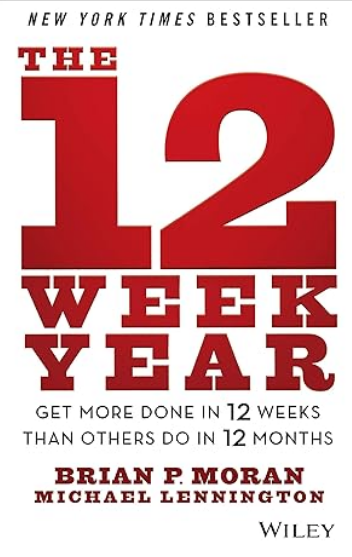Author: Brian P. Moran & Michael Lennington
“The 12 Week Year” by Brian P. Moran and Michael Lennington is a productivity book that challenges the traditional annual planning model. Instead, it advocates for a 12-week cycle to achieve more in less time. Here’s a detailed summary and some reviews:
Summary
1. Introduction:
The book begins by addressing the common pitfalls of annual planning, such as procrastination and lack of urgency. It introduces the concept of the 12-week year, which aims to create a sense of urgency and focus.
2. Redefining the Year:
Moran and Lennington argue that annual goals often lead to complacency. By breaking the year into 12-week cycles, each week becomes crucial, fostering a mindset of continuous progress.
3. Emotional Connection:
A strong emotional connection to your goals is essential. The authors emphasize the importance of having a compelling vision that aligns with your personal and professional aspirations.
4. Throw Out the Annual Plan:
The book suggests discarding the traditional annual plan in favor of shorter, more manageable 12-week plans. This approach helps in maintaining focus and adaptability.
5. One Week at a Time:
Each week is treated as a mini-year, with specific goals and tasks. This method ensures that every week counts and contributes to the overall objective.
6. Confronting the Truth:
Honesty and self-awareness are crucial. The authors encourage readers to confront their current reality and identify areas that need improvement.
7. Intentionality and Accountability:
Being intentional about your actions and holding yourself accountable are key themes. The book provides strategies for maintaining accountability, such as regular reviews and tracking progress.
8. The Execution System:
The core of the book is its execution system, which includes:
- Vision: Establishing a clear vision for what you want to achieve.
- Planning: Developing a detailed 12-week plan.
- Process Control: Implementing systems to monitor progress.
- Scorekeeping: Keeping track of your achievements and setbacks.
- Time Management: Taking control of your day to maximize productivity.
9. Final Thoughts and the 13th Week:
The book concludes with advice on how to review your progress at the end of each 12-week cycle and plan for the next one. The 13th week is a time for reflection and preparation.
Reviews
1. Positive Reviews:
Many readers appreciate the practical and actionable advice provided in the book. They find the 12-week framework effective in boosting productivity and achieving goals. The emphasis on accountability and regular reviews is often highlighted as a strength¹².
2. Critical Reviews:
Some critics argue that the book’s concepts are not entirely new and can be found in other productivity literature. Others feel that the 12-week cycle might be too short for certain long-term projects³.
Overall, “The 12 Week Year” is praised for its clear structure and motivational approach, making it a valuable resource for anyone looking to enhance their productivity and achieve their goals more efficiently.
Source:
(1) The 12 Week Year by Brian Moran | Summary – The Process Hacker. https://theprocesshacker.com/blog/the-12-week-year-brian-moran-summary/.
(2) The 12 Week Year by Brian Moran: Summary and Notes. https://dansilvestre.com/summaries/12-week-year/.
(3) The 12 Week Year – Critical summary review – Brian P. Moran. https://12min.com/the-12-week-year-summary.
(4) The 12 Week Year Summary of Key Ideas and Review – Blinkist. https://www.blinkist.com/en/books/the-12-week-year-en.
(5) The 12 Week Year Summary – Briefer. https://briefer.com/books/12-week-year/pdf.


Leave a Reply